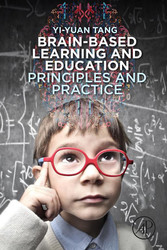
Brain-Based Learning and Education - Principles and Practice

von: Yi-Yuan Tang
Elsevier Reference Monographs, 2017
ISBN: 9780128105092
Sprache: Englisch
81 Seiten, Download: 3252 KB
Format: PDF, auch als Online-Lesen
| Front Cover | 1 | ||
| Brain-Based Learning and Education | 4 | ||
| Copyright Page | 5 | ||
| Dedication | 6 | ||
| Contents | 8 | ||
| List of Figures | 10 | ||
| Preface | 12 | ||
| Acknowledgments | 16 | ||
| 1 Challenges and Issues in Education | 18 | ||
| 2 Brain Networks Involved in Learning and Teaching | 24 | ||
| 2.1 Attention and Self-Control Networks | 24 | ||
| 2.2 Memory Networks | 24 | ||
| 2.3 Emotion Networks | 25 | ||
| 2.4 Reward and Habit Networks | 26 | ||
| 2.5 Social and Self-Referential Networks | 27 | ||
| 3 Attention and Self-Control in Education | 30 | ||
| 3.1 Attention in Learning and Education | 30 | ||
| 3.2 Self-control in Learning and Education | 33 | ||
| 4 Curiosity and Creativity Motivate Self-Learning | 36 | ||
| 4.1 Curiosity and Self-learning | 36 | ||
| 4.2 Creativity and Self-learning | 37 | ||
| 5 Developing Characters Through Neuroscience Findings | 42 | ||
| 5.1 Self-control | 42 | ||
| 5.2 Compassion, Empathy and Emotion Regulation | 44 | ||
| 5.3 How Does Mindfulness Enhance Emotion Regulation, Empathy and Compassion? | 45 | ||
| 5.4 Wisdom | 46 | ||
| 5.5 Wisdom and implicit learning | 47 | ||
| 6 How the Social Brain Supports Learning and Teaching | 50 | ||
| 6.1 Default Mode Network and Brain Resources | 50 | ||
| 6.2 Social Brain in Learning and Teaching | 51 | ||
| 7 Healthy Brain Boosts Education Outcomes | 54 | ||
| 7.1 Reducing stress using few hours of mindfulness meditation | 54 | ||
| 7.2 Teacher–student interaction | 57 | ||
| 7.3 Mind-Wandering | 59 | ||
| 7.4 How to Reduce Mind-Wandering and Minimize Its Negative Consequences? | 60 | ||
| 8 Personalized Education | 62 | ||
| 8.1 Different Learners and Capacities | 62 | ||
| 8.2 Gene, Personality, Environment and Education Outcomes | 63 | ||
| 9 Insight for Optimal Learning and Education | 66 | ||
| 9.1 Building a New Learning and Education Environment | 66 | ||
| 9.2 Science of Learning and Teaching | 67 | ||
| 9.2.1 Multitasking | 67 | ||
| 9.2.2 Mind–Body Interaction and Optimal Performance | 67 | ||
| 9.2.3 An Optimal and Individualized Curriculum for Talent Development | 69 | ||
| 9.2.4 Concept-Based Curriculum | 70 | ||
| 9.2.5 Keep Balance Between Technology and Human Nature | 70 | ||
| 9.3 Wisdom as an Ultimate Goal of Education | 71 | ||
| References | 72 | ||
| Index | 78 | ||
| Back Cover | 81 |







